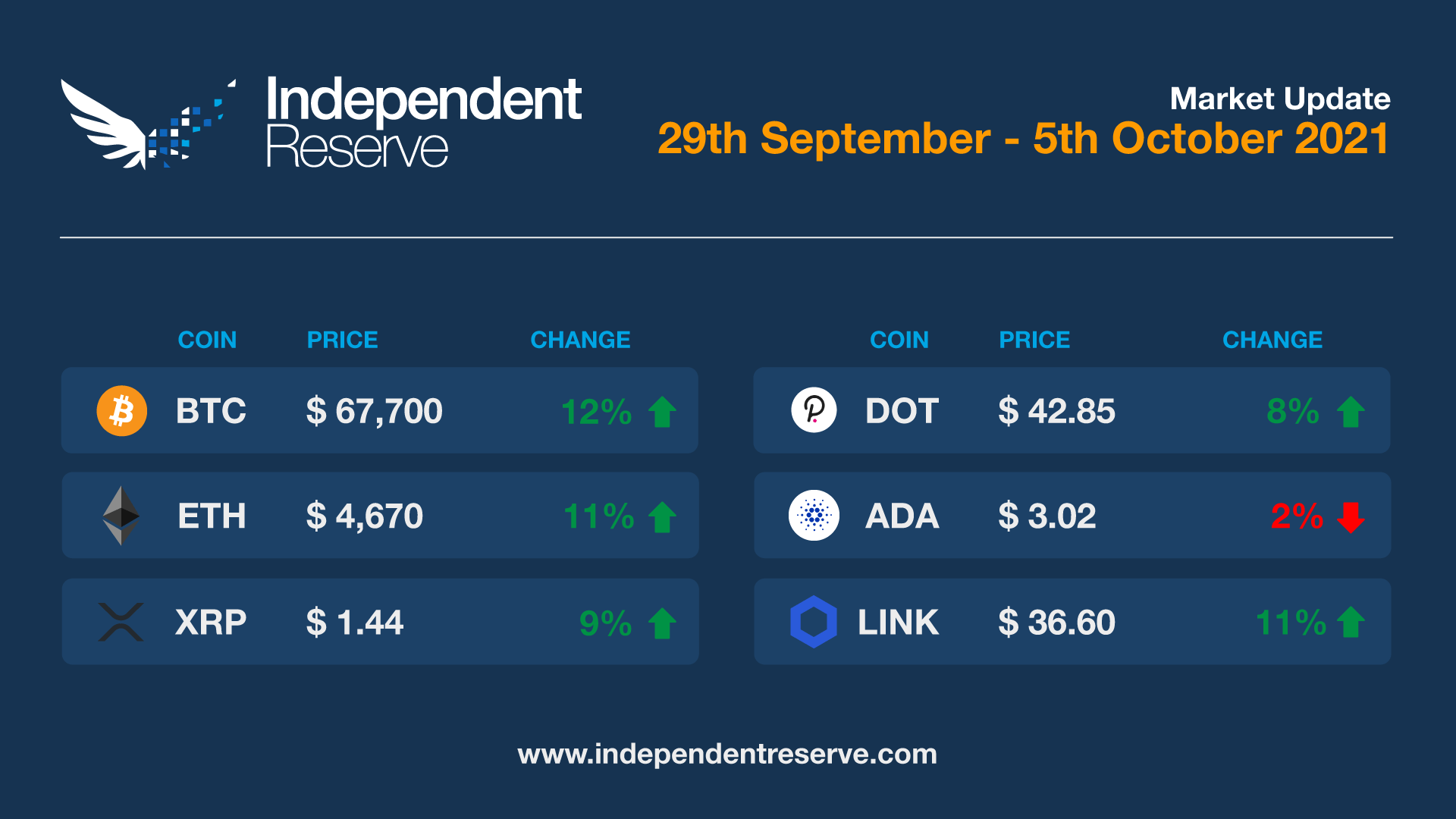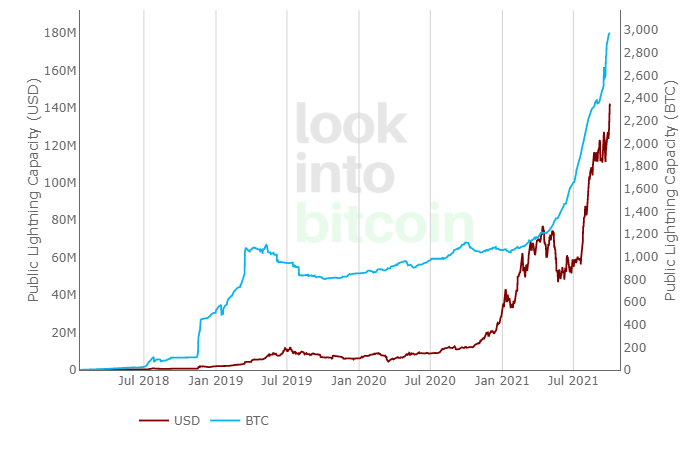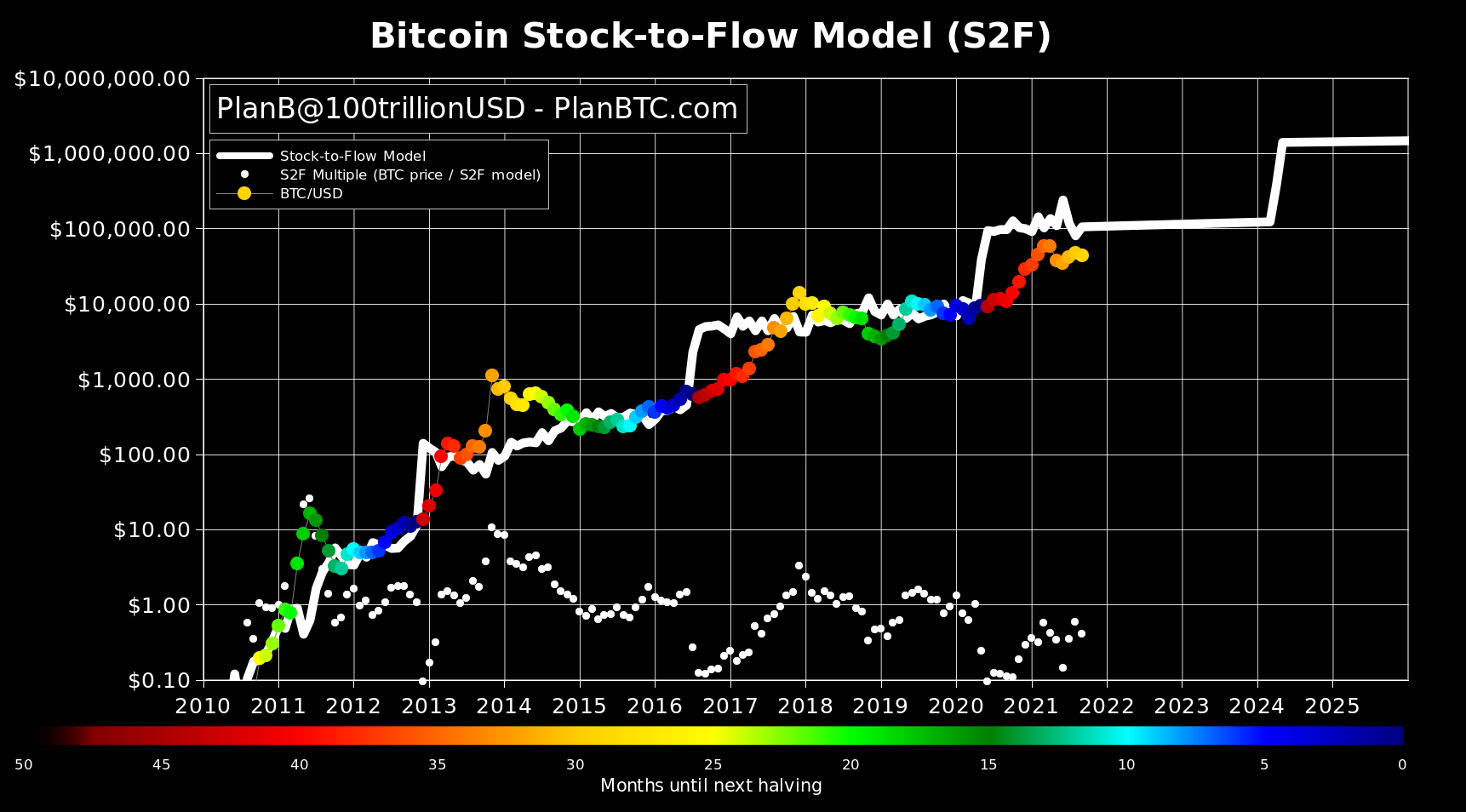In Markets
September is historically the worst month for Bitcoin and the price was hit by fears over Evergrande and the latest China crackdown … but we have now entered what Crypto Twitter optimistically calls ‘Uptober’. The global crypto market cap is back at US$2.1 trillion (AU$2.9T) – more than the US junk bond market – and around 86% of the supply is currently in profit. Bitcoin is up 12% on the same time last week to trade just under the US$50K mark, at around AU$67K. Ethereum also jumped 12.3%, Ripple (9%), Polkadot (8%), Chainlink (11%). Cardano was flat. The Crypto Fear and Greed Index is at 54 or neutral. Despite the recent market rebranding of October, it’s also the month that saw the 1929 Stock Market Crash and Black Monday in 1987…

From the IR OTC Desk
This week will provide critical information on how the Reserve Bank of Australia (RBA) and the Reserve Bank of New Zealand (RBNZ) are viewing their respective economies. The RBA are set to meet today (Tuesday 05 October), with the market particularly interested in the Bank’s view on energy price increases (in the US, China, UK, and EU), credit market considerations for Evergrande, and any change in inflation expectations for Australia. Other important details may relate to house prices, and their effect on financial stability and any future macro prudential lending restrictions. All this said, the RBA has always shown a very calming hand, and while they may address some of these points today the expectation is for the broad thematic and guidance from the meeting to remain broadly unchanged.
The RBNZ, however, is expected to lift the underlying cash rate (Wednesday 06 October), from 0.25% to 0.50% (a 25bps increase). In what could be a sign that emergency monetary policy settings are no longer needed, economists are forecasting that the Bank is more comfortable with the economic recovery path from the recent Delta outbreak: and expecting that strong labour market demand and price inflation will likely result in a measured adjustment to the cash rate from the RBNZ. Communication and guidance for any change to the cash rate will prove critical.
On the OTC desk, the lack of negative regulatory headlines, the beginning of a new month, and the ability for BTC and ETH to remain above their critical support levels (BTC US$40k, ETH US$2,800), saw a broad-based market rally into the weekend. The timing of the rally seemed to coincide with an analyst report weighting BTC ETF probabilities, and their percentage chance of being approved before the end of the calendar year. In quite an orderly price reset higher, realised vol. remained well constrained. Interestingly, the crypto market seemed unconcerned with stagflation headlines or equity market gyrations. This week we have seen more activity in ETH than BTC, and continue to see high volumes of flow in USDT and USDC.
For any trading needs, please don’t hesitate to get in touch.
In Headlines
Independent Reserve gains full licence in Singapore
On the 1st of October 2021, Independent Reserve was the first exchange to receive full licensure approval to operate as a regulated provider for Digital Payment Token Services in Singapore. The Monetary Authority of Singapore approved the licence under the Payment Services Act and we are proudly one of the first fully licensed virtual asset service providers in Singapore.
The Independent Reserve OTC desk is also open for deals over SG$ 100k in value, please reach out if you have any trading requirements we can help with.
Lightning network tops 3,000 BTC
The Lightning Network has increased capacity by 27% in the space of a month and now has around 3,000 BTC locked, an all-time record. Bitcoin’s hash rate has also been climbing since July and is currently around 145TH/s; on its way back toward the record of 180TH/s seen in mid May.

Bitcoin Lightning Capacity [Source: lookintobitcoin.com]
Evergrande, stagflation fears
Evergrande’s ability to repay US$305B (AU$420B) of debts continues to concern global markets with shares in the property giant suspended in Hong Kong yesterday. However Peter Cai, a research fellow with the Lowy Institute, told The Guardian he believed China’s banks can absorb the losses even if foreign bond holders would “probably get a haircut” and that it was “quite unlikely to cause the kind of systematic meltdown we experienced in 2008”. The other big worry is stagflation, which is high inflation, high unemployment and low economic growth last seen during the oil crisis in the 1970s. Bank of America analysts have declared “stagflation is here” even as energy shortages hit China, Europe and the UK.
Fed Reserve has “no intention” of banning Bitcoin
Federal Reserve chair Jerome Powell told Congress late last week that unlike China, the US has “no intention to ban cryptocurrencies“. This put a rocket under the Bitcoin price, rising around 15% in a day or so. Powell signaled he is going after stablecoins however, seeing them as a threat to stability of financial markets. The Wall Street Journal reported the Biden Administration wants to create a “special purpose charter” for stable coin issuers that would put them in the same category as banks and ensure they have appropriate reserves. The WSJ also reported that the Fed could initiate a formal review of the case for a CBDC this week. Meanwhile the deadline for a vote on the US$1.2 trillion (AU$1.6T) Infrastructure bill – with its nasty crypto tax provisions – has also come and gone, with Democrats fighting each other about whether to pass it without also passing a related US$3.5B (AU$4.8B) infrastructure bill. Analysts believe a compromise will be hammered out.
Institutional news
Morgan Stanley has more than doubled its exposure to the Grayscale Bitcoin Trust since April. Visa is working on something called a “universal payment channel” connecting various blockchains and enabling the use of any cryptocurrency or CBDC. And Jamie Dimon, CEO of JPMorgan Chase said this week he wouldn’t buy BTC even if it went ten times from here, that it has no intrinsic value and “regulators are going to regulate the hell out of it.” The SEC also kicked the can down the road on decisions for four Bitcoin ETFs from Global X Bitcoin Trust, Valkyrie XBTO Bitcoin Futures Fund, Krypton Bitcoin ETF, and WisdomTree Bitcoin Trust.
Ethereum Trust most traded, ETH most targeted
For the first time ever the Grayscale Ethereum Trust was the most traded digital asset product in September with daily volume increasing 29% to US$250M (AU$343M). But in China the mining crackdown moved to Ethereum mining, with the second largest mining pool SparkPool shutting up shop, closely followed by the fourth largest BeePool. Both cited China’s regulations as the deciding factor. Together the pools accounted for more than one quarter of Ethereum’s hashrate.
Cardano undervalued?
A new research report from Grayscale suggests that Cardano, which recently launched smart contract capabilities, may be undervalued relative to Ethereum and Bitcoin. The report argued that Cardano has settled over $1.6 trillion (AU$2.2T) in total on-chain transaction value over the last 12 months, which is around 40% less than Ether and 50% less than Bitcoin, but the analysts noted the market cap for ADA is 80% and 90% lower respectively than ETH or BTC. However the report’s figures for ETH appear to be an underestimate with Messari pointing out this week that Ethereum has settled US$6.2T (AU$8.5T) in transactions in the past year.
PlanB’s Plan B predictions
PlanB outlined some ‘worst case scenarios’ for the Bitcoin price back in June, and was quite accurate with his predictions. His suggested closing prices in August (US$47K / AU$65K) and September (US$43K / AU$59K) both came to pass. The prediction suggests US$63K (AU$86.4K) for the end of this month, US$98K (AU$134.4K) for November and US$135K (AU$185K) for December. The crystal ball gazing is not based on his Stock to Flow model however, as that suggests the price should be above US$100K (AU$137K) already.

S2F Model September close
Fuel discount for Chivo wallet users
A number of the largest gas station companies in El Salvador will drop the price of gas per gallon for citizens paying with the government ‘Chivo’ wallet. President Nayib Bukele announced a saving of $0.20 per gallon. In conjunction with this discount, the president had signed an order to subsidise gasoline in the country, absorbing and stopping what would have been an expected increase in price for a year. Bukele said, “this will not only alleviate the pockets of households but also that of small businesses, helping to strengthen our economy, and the most vulnerable sectors will also feel the benefit of the economic growth that our country is having”.
Snowden on Bitcoin’s resiliency
Commenting on the resiliency of Bitcoin over the past year and a half, Edward Snowden still tracks and tweets to his 5 million followers on the cryptocurrency. Despite various global campaigns to undermine the public understanding of cryptocurrencies, Snowden recently said, “sometimes I think back to this and wonder how many people bought Bitcoin then,” referring to the ‘little reasoned’ March 2020 crash. He also touched on China miner bans, believing that it only makes Bitcoin “stronger” and in any case, decentralises it further. He more recently tweeted on geopolitical adoption after El Salvador made Bitcoin legal tender, highlighting that the currency “incentivizes early adoption”, thereby putting pressure on other nations and punishing those who are laggards.
Until next week, happy trading!


